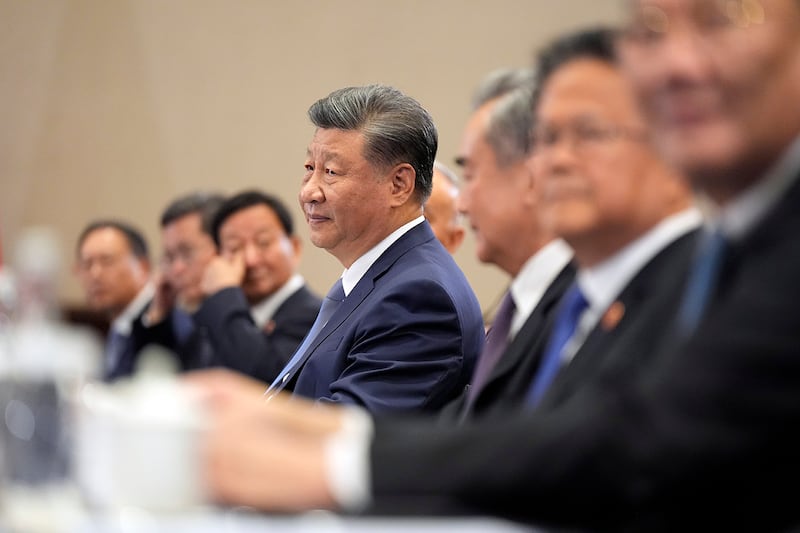Read coverage of this story in Chinese
Beijing stands ready to cooperate with the incoming Trump administration to achieve a “smooth transition,” Chinese President Xi Jinping told outgoing U.S. President Joe Biden on Saturday.
“China is ready to maintain communication with the new U.S. government, expand cooperation, manage differences and strive to achieve a smooth transition in Sino-U.S. relations for the benefit of the people of both countries,” Xi told Biden at a meeting during the Asia-Pacific Economic Cooperation, or APEC, summit in Lima, Peru.
However, Xi – who did not directly mention the U.S. president-elect by name – hinted at concerns over Trump’s plans for extensive tariffs on all imports from China, including threats of rates of up to 60%.
“Competition between major powers shouldn’t become the overriding logic of the times,” Xi said, before warning against even the “small yard, high fence” approach to tariffs, which is a description used by the Biden administration to refer to its targeted set of tariffs on China.
In comments paraphrased by state media, Xi reportedly also told Biden that “a new Cold War should not be fought and cannot be won” and that “containing China is unwise, unacceptable and bound to fail.”
RELATED STORIES
Biden, Xi video summit likely to seek ‘guardrails,’ damage control
China expecting harder times after Trump victory
China hawk Marco Rubio nominated for US secretary of state
The state-run Global Times newspaper said in an editorial that the meeting “sent a clear signal to the outside world that China and the U.S. are determined to stabilize bilateral relations and get them back on track, regardless of the change in the U.S. government.”
The newspaper said the “biggest barrier” in bilateral ties lies was the U.S. “perception of China as its No.1 strategic competitor.”
Trump is set to be inaugurated as U.S. president for the second time on Jan. 20 and has since his Nov. 5 election victory nominated a slew of “China hawks” for his top foreign policy positions, including Sen. Marco Rubio of Florida, who has a long record of criticizing Beijing.
Competition, not conflict
Biden’s meeting with Xi came almost exactly a year to the day of the two leaders’ high-profile summit in San Francisco, which put an end to 18 months of tensions between the United States and China.
The outgoing president said he was proud to have restored regular diplomatic conversations with China, even if major areas of difference still exist between how the two governments view the world.
“We haven’t always agreed, but our conversations have always been candid and always been frank,” Biden said. “I think that’s vital – these conversations prevent miscalculations and they ensure the competition between our two countries will not veer into conflict.”
“These conversations prevent miscalculations, and they ensure the competition between our two countries will not veer into conflict.”

Biden also called on Xi to dissuade North Korea from further deepening its support for Russia’s war on Ukraine, according to a readout.
He condemned the deployment of thousands of North Korea troops to Russia, calling it “a dangerous expansion of Russia’s unlawful war against Ukraine with serious consequences for both European and Indo-Pacific peace and security,” aided by China’s support for Russia.
The White House described the talks as “candid and constructive” and said they covered bilateral, regional and global issues, including counternarcotics, military-military communication, AI-related risks, climate change and future people-to-people exchanges.
Biden also thanked Xi for China’s scheduling of 55 new synthetic drugs and precursors, arrests linked to the opioid trade and the closure of online platforms that supply precursors – all part of Xi’s pledge to Biden to crackdown on the flow of synthetic opioids from China to America.
Reset, but in which direction?
The transition from a Biden to Trump administration in two months will provide an opportunity for a reset in relations between Washington and Beijing, but it’s not yet clear what that will mean in practice.
Trump campaigned on being tougher on China, but in the past he has expressed admiration for Xi.
Biden, meanwhile, strived to maintain a sense of diplomatic normalcy with China but was also not afraid to censure Beijing, even calling Xi a “dictator” after last year’s summit.
U.S.-China ties deteriorated sharply after Biden took office in January 2021, with major sticking points emerging on Taiwan, Xinjiang, Hong Kong, the South China Sea, trade policy and intellectual property.

Tensions grew following Russia’s invasion of Ukraine and the August 2022 visit of then-U.S. House Speaker Nancy Pelosi to Taiwan. The early 2023 spy-balloon incident led to further strains in ties, but they were largely eased by Biden and Xi’s summit last November.
Nevertheless, serious differences remain on Ukraine, Taiwan, the South China Sea and trade – all things that Xi likely will be looking to address with Trump, said Ye Yaoyuan, a professor of international studies at the University of St. Thomas in Minnesota.
“Over the four years that Biden has been in office ... competition between the two sides has become more intense, but the red lines have also been drawn more and more clearly,” Ye told Radio Free Asia. “[Xi] wants to emphasize that it’s unreasonable to try to contain China.”
Ye added that Xi and other Chinese leaders would be taking seriously Trump’s proposed tariffs on China and his appointment and nomination of the several “China hawks” for his top foreign-policy advisory roles.
“He did almost everything he said he would before he was elected” the first time around, Ye said. “He’s actually very predictable.”
Translated by Luisetta Mudie. Edited by Alex Willemyns.
